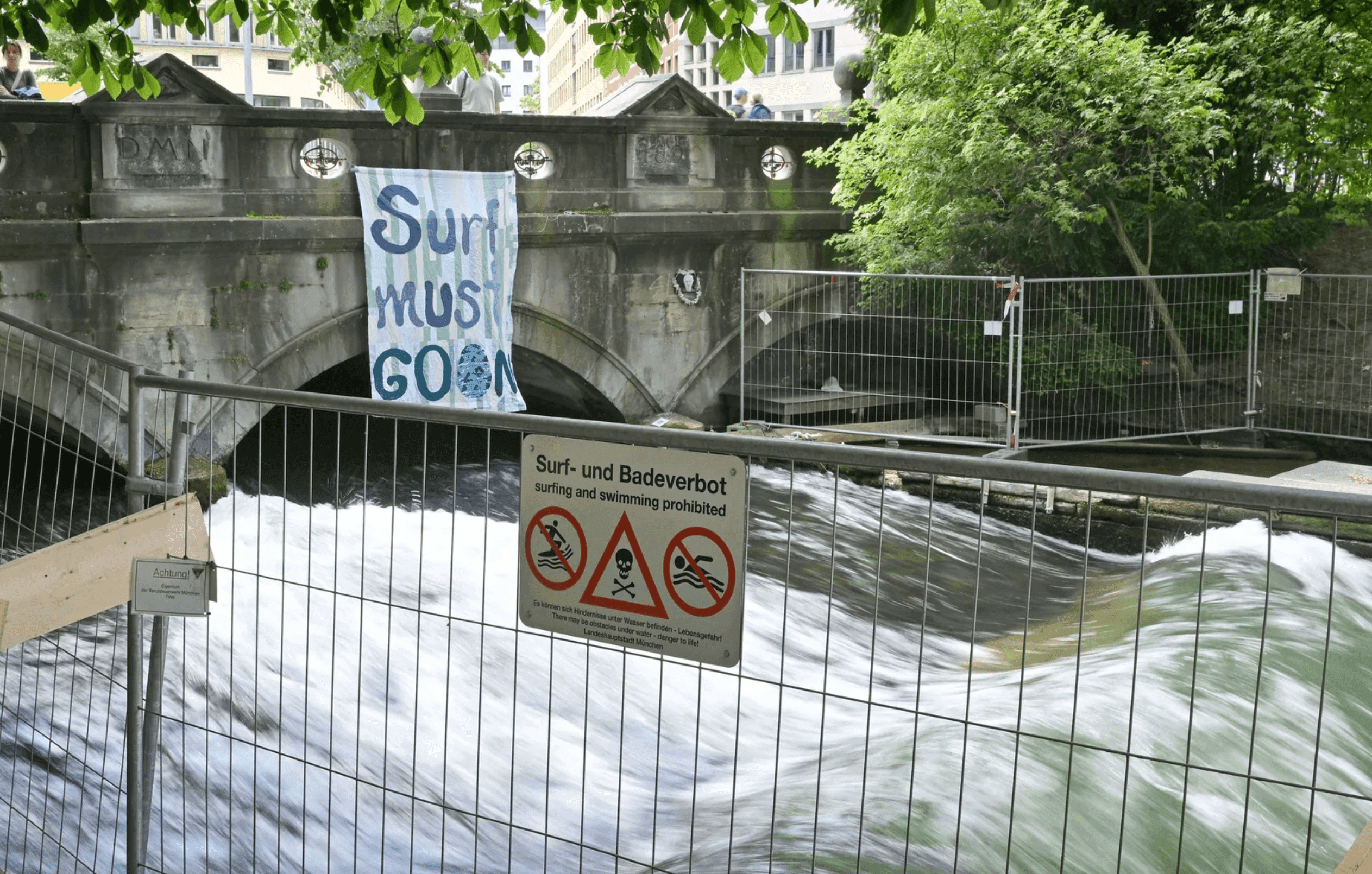
The Eisbachwelle, Munich's iconic urban surfing spot in the English Garden, remains closed following a tragic accident two months ago involving a 33-year-old surfer. Despite efforts to lower the water level, the exact cause of her death has yet to be determined, and investigations by police and public prosecutors are ongoing. Until a resolution is reached, Mayor Dieter Reiter has opted to keep the wave off-limits, a decision that has sparked a fierce debate between local authorities and the city's surfing community.
The closure has prompted widespread protests. Surfers have penned an open letter to the mayor, accompanied by thousands of signatures, urging the reopening of the wave, which has been a beloved part of Munich's culture for decades. The controversy even gained international attention when former NFL superstar Tom Brady, visiting the city for a Champions League final, posed with a protest sign reading "Surfing is not a crime." Despite this high-profile support, the wave remains inaccessible, frustrating surfers who view the lockdown as an infringement on personal freedoms.
In recent days, provocative protest banners have appeared at the site. One challenges Bavarian Justice Minister Georg Eisenreich, questioning the sluggishness of the investigation while referencing Munich's bid to host future Olympic Games. Others poke fun at municipal authorities' removal of previous signs, with slogans such as "No problem, we’ll just put them back up." A particularly pointed sign compares the wave's closure to an unrelated fatal accident at the Allianz Arena, asking whether the stadium should also be shut down. The origin of these banners is unclear, but they are believed to stem from the surfing community.
The debate has also reignited discussions about risk management and personal responsibility. Advocates argue that the wave is an integral part of Munich’s identity and that the inherent risks of surfing should be accepted, similar to alpine sports or large public events like Oktoberfest. Critics, however, question whether the city should promote an activity with potential dangers. Statistically, fatal incidents at the Eisbach have been exceedingly rare over its decades-long history, leading many to call for the wave’s reopening with improved safety measures.
As tensions persist, the fate of the Eisbachwelle hangs in the balance. For surfers and their supporters, the wave represents more than just a recreational pursuit—it’s a symbol of freedom, community, and the city's vibrant culture. With public opinion divided and legal proceedings ongoing, it remains uncertain when, or if, Munich's famed surf spot will welcome riders back to its waters.


The Eisbachwelle, Munich's iconic urban surfing spot in the English Garden, remains closed following a tragic accident two months ago involving a 33-year-old surfer. Despite efforts to lower the water level, the exact cause of her death has yet to be determined, and investigations by police and public prosecutors are ongoing. Until a resolution is reached, Mayor Dieter Reiter has opted to keep the wave off-limits, a decision that has sparked a fierce debate between local authorities and the city's surfing community.
The closure has prompted widespread protests. Surfers have penned an open letter to the mayor, accompanied by thousands of signatures, urging the reopening of the wave, which has been a beloved part of Munich's culture for decades. The controversy even gained international attention when former NFL superstar Tom Brady, visiting the city for a Champions League final, posed with a protest sign reading "Surfing is not a crime." Despite this high-profile support, the wave remains inaccessible, frustrating surfers who view the lockdown as an infringement on personal freedoms.
In recent days, provocative protest banners have appeared at the site. One challenges Bavarian Justice Minister Georg Eisenreich, questioning the sluggishness of the investigation while referencing Munich's bid to host future Olympic Games. Others poke fun at municipal authorities' removal of previous signs, with slogans such as "No problem, we’ll just put them back up." A particularly pointed sign compares the wave's closure to an unrelated fatal accident at the Allianz Arena, asking whether the stadium should also be shut down. The origin of these banners is unclear, but they are believed to stem from the surfing community.
The debate has also reignited discussions about risk management and personal responsibility. Advocates argue that the wave is an integral part of Munich’s identity and that the inherent risks of surfing should be accepted, similar to alpine sports or large public events like Oktoberfest. Critics, however, question whether the city should promote an activity with potential dangers. Statistically, fatal incidents at the Eisbach have been exceedingly rare over its decades-long history, leading many to call for the wave’s reopening with improved safety measures.
As tensions persist, the fate of the Eisbachwelle hangs in the balance. For surfers and their supporters, the wave represents more than just a recreational pursuit—it’s a symbol of freedom, community, and the city's vibrant culture. With public opinion divided and legal proceedings ongoing, it remains uncertain when, or if, Munich's famed surf spot will welcome riders back to its waters.